Unit 4 Don't eat in class.综合测试题(word版,无答案)
文档属性
| 名称 | Unit 4 Don't eat in class.综合测试题(word版,无答案) | 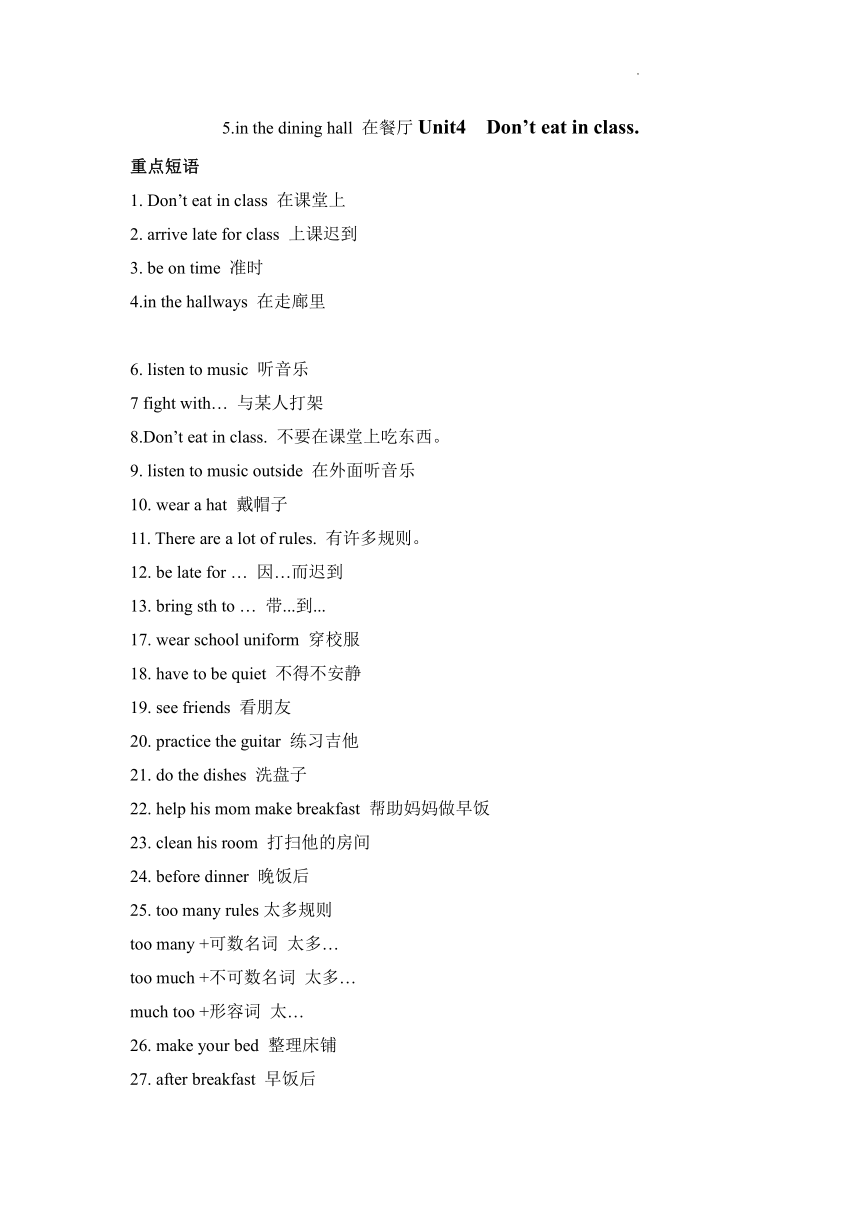 | |
| 格式 | docx | ||
| 文件大小 | 39.2KB | ||
| 资源类型 | 教案 | ||
| 版本资源 | 人教新目标(Go for it)版 | ||
| 科目 | 英语 | ||
| 更新时间 | 2022-04-02 20:07:56 | ||
图片预览

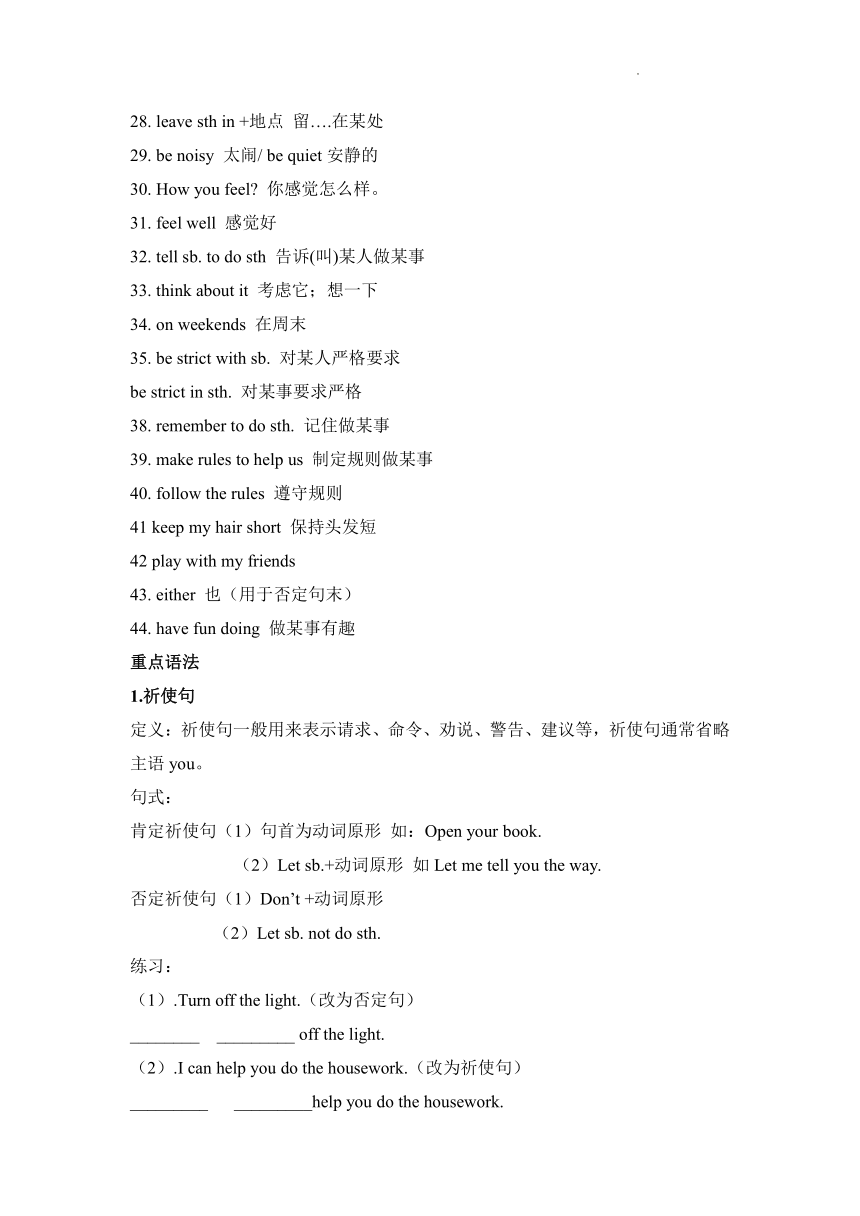
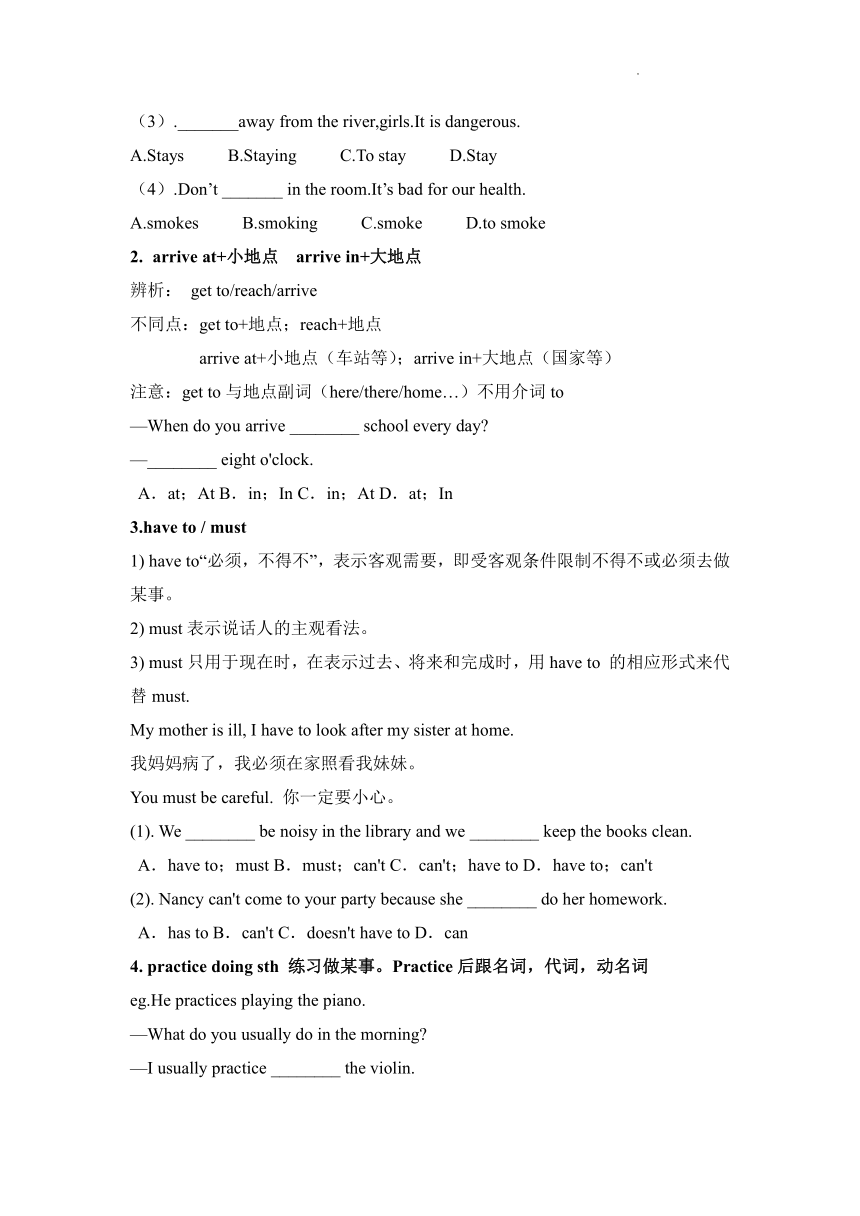
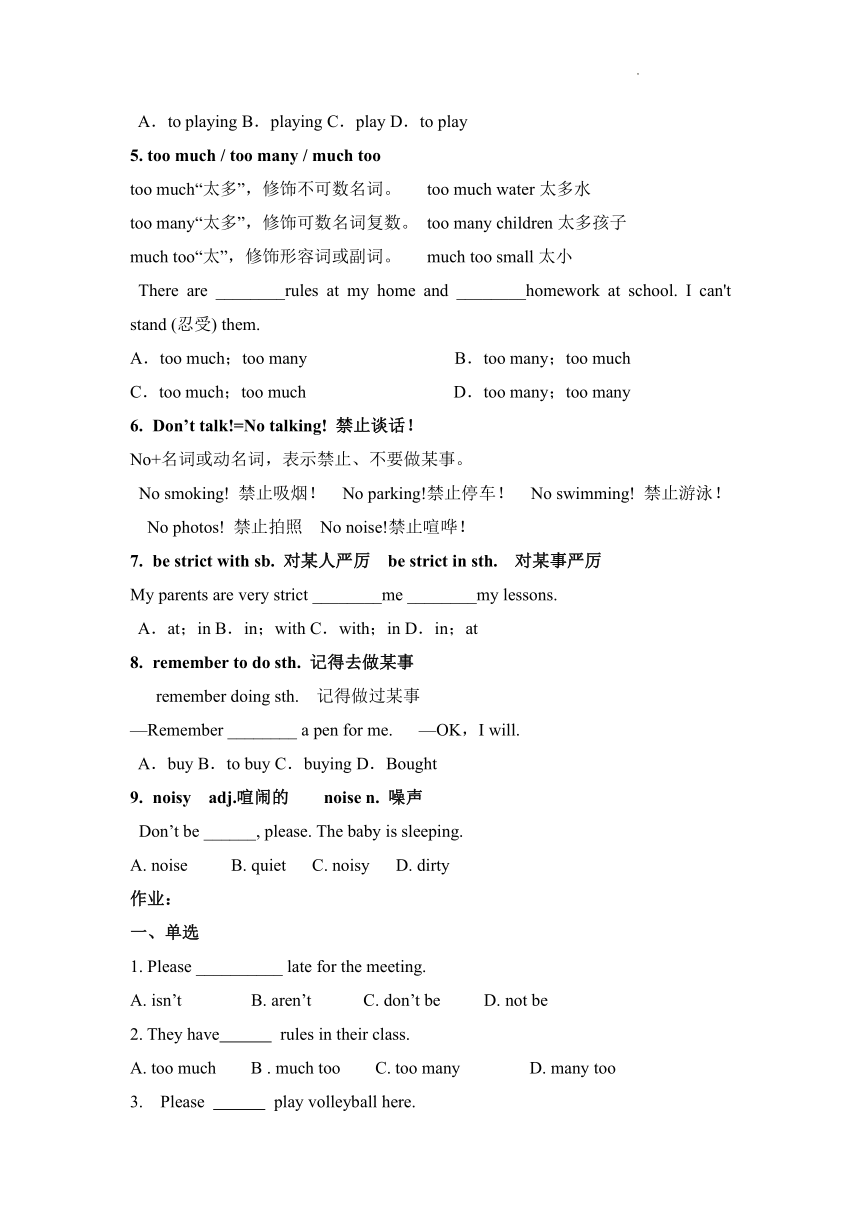
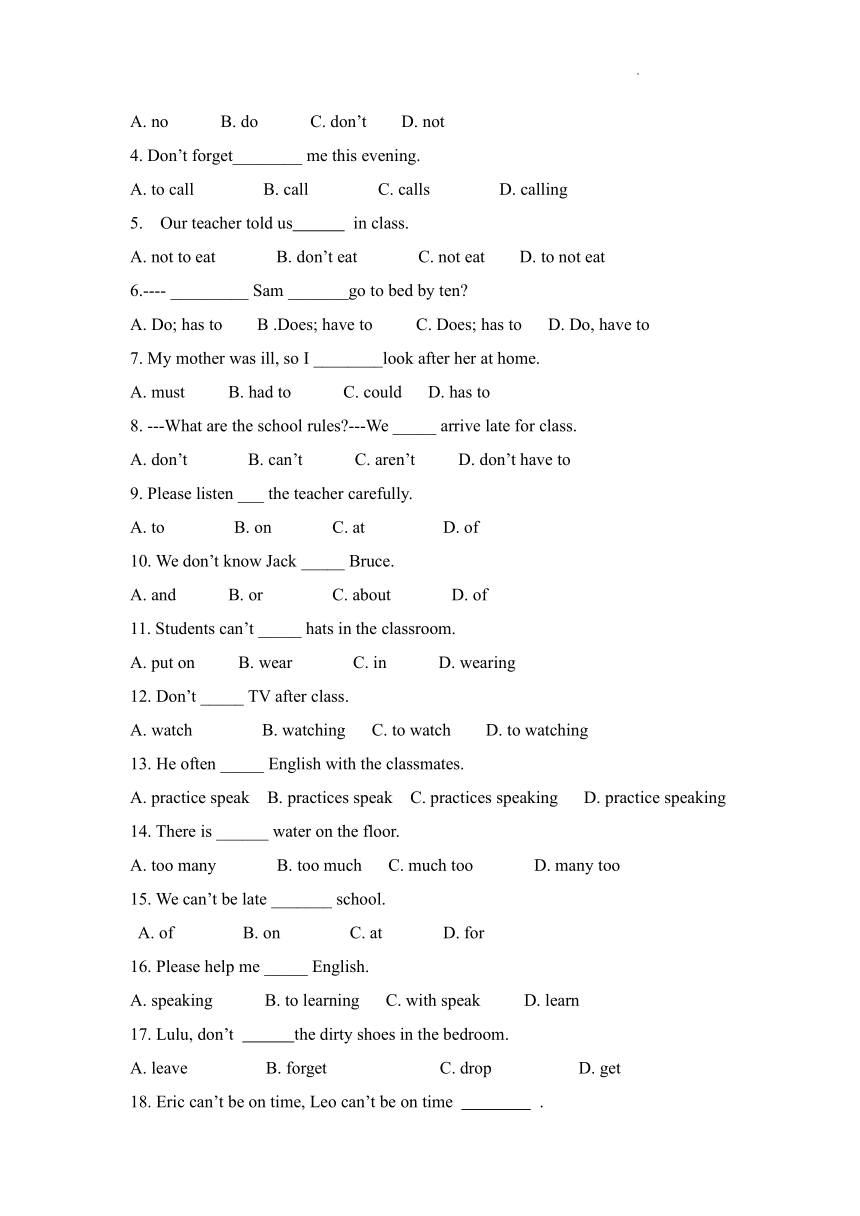
文档简介
5.in the dining hall 在餐厅Unit4 Don’t eat in class.
重点短语
1. Don’t eat in class 在课堂上
2. arrive late for class 上课迟到
3. be on time 准时
4.in the hallways 在走廊里
6. listen to music 听音乐
7 fight with… 与某人打架
8.Don’t eat in class. 不要在课堂上吃东西。
9. listen to music outside 在外面听音乐
10. wear a hat 戴帽子
11. There are a lot of rules. 有许多规则。
12. be late for … 因…而迟到
13. bring sth to … 带...到...
17. wear school uniform 穿校服
18. have to be quiet 不得不安静
19. see friends 看朋友
20. practice the guitar 练习吉他
21. do the dishes 洗盘子
22. help his mom make breakfast 帮助妈妈做早饭
23. clean his room 打扫他的房间
24. before dinner 晚饭后
25. too many rules太多规则
too many +可数名词 太多…
too much +不可数名词 太多…
much too +形容词 太…
26. make your bed 整理床铺
27. after breakfast 早饭后
28. leave sth in +地点 留….在某处
29. be noisy 太闹/ be quiet安静的
30. How you feel 你感觉怎么样。
31. feel well 感觉好
32. tell sb. to do sth 告诉(叫)某人做某事
33. think about it 考虑它;想一下
34. on weekends 在周末
35. be strict with sb. 对某人严格要求
be strict in sth. 对某事要求严格
38. remember to do sth. 记住做某事
39. make rules to help us 制定规则做某事
40. follow the rules 遵守规则
41 keep my hair short 保持头发短
42 play with my friends
43. either 也(用于否定句末)
44. have fun doing 做某事有趣
重点语法
1.祈使句
定义:祈使句一般用来表示请求、命令、劝说、警告、建议等,祈使句通常省略主语you。
句式:
肯定祈使句(1)句首为动词原形 如:Open your book.
(2)Let sb.+动词原形 如Let me tell you the way.
否定祈使句(1)Don’t +动词原形
Let sb. not do sth.
练习:
(1).Turn off the light.(改为否定句)
________ _________ off the light.
(2).I can help you do the housework.(改为祈使句)
_________ _________help you do the housework.
(3)._______away from the river,girls.It is dangerous.
A.Stays B.Staying C.To stay D.Stay
(4).Don’t _______ in the room.It’s bad for our health.
A.smokes B.smoking C.smoke D.to smoke
arrive at+小地点 arrive in+大地点
辨析: get to/reach/arrive
不同点:get to+地点;reach+地点
arrive at+小地点(车站等);arrive in+大地点(国家等)
注意:get to与地点副词(here/there/home…)不用介词to
—When do you arrive ________ school every day
—________ eight o'clock.
A.at;At B.in;In C.in;At D.at;In
3.have to / must
1) have to“必须,不得不”,表示客观需要,即受客观条件限制不得不或必须去做某事。
2) must表示说话人的主观看法。
3) must只用于现在时,在表示过去、将来和完成时,用have to 的相应形式来代替must.
My mother is ill, I have to look after my sister at home.
我妈妈病了,我必须在家照看我妹妹。
You must be careful. 你一定要小心。
(1). We ________ be noisy in the library and we ________ keep the books clean.
A.have to;must B.must;can't C.can't;have to D.have to;can't
(2). Nancy can't come to your party because she ________ do her homework.
A.has to B.can't C.doesn't have to D.can
4. practice doing sth 练习做某事。Practice后跟名词,代词,动名词
eg.He practices playing the piano.
—What do you usually do in the morning
—I usually practice ________ the violin.
A.to playing B.playing C.play D.to play
5. too much / too many / much too
too much“太多”,修饰不可数名词。 too much water太多水
too many“太多”,修饰可数名词复数。 too many children太多孩子
much too“太”,修饰形容词或副词。 much too small太小
There are ________rules at my home and ________homework at school. I can't stand (忍受) them.
A.too much;too many B.too many;too much
C.too much;too much D.too many;too many
Don’t talk!=No talking! 禁止谈话!
No+名词或动名词,表示禁止、不要做某事。
No smoking! 禁止吸烟! No parking!禁止停车! No swimming! 禁止游泳!
No photos! 禁止拍照 No noise!禁止喧哗!
be strict with sb. 对某人严厉 be strict in sth. 对某事严厉
My parents are very strict ________me ________my lessons.
at;in B.in;with C.with;in D.in;at
remember to do sth. 记得去做某事
remember doing sth. 记得做过某事
—Remember ________ a pen for me. —OK,I will.
buy B.to buy C.buying D.Bought
noisy adj.喧闹的 noise n. 噪声
Don’t be ______, please. The baby is sleeping.
A. noise B. quiet C. noisy D. dirty
作业:
单选
1. Please __________ late for the meeting.
A. isn’t B. aren’t C. don’t be D. not be
2. They have rules in their class.
A. too much B . much too C. too many D. many too
3. Please play volleyball here.
A. no B. do C. don’t D. not
4. Don’t forget________ me this evening.
A. to call B. call C. calls D. calling
5. Our teacher told us in class.
A. not to eat B. don’t eat C. not eat D. to not eat
6.---- _________ Sam _______go to bed by ten
A. Do; has to B .Does; have to C. Does; has to D. Do, have to
7. My mother was ill, so I ________look after her at home.
A. must B. had to C. could D. has to
8. ---What are the school rules ---We _____ arrive late for class.
A. don’t B. can’t C. aren’t D. don’t have to
9. Please listen ___ the teacher carefully.
A. to B. on C. at D. of
10. We don’t know Jack _____ Bruce.
A. and B. or C. about D. of
11. Students can’t _____ hats in the classroom.
A. put on B. wear C. in D. wearing
12. Don’t _____ TV after class.
A. watch B. watching C. to watch D. to watching
13. He often _____ English with the classmates.
A. practice speak B. practices speak C. practices speaking D. practice speaking
14. There is ______ water on the floor.
A. too many B. too much C. much too D. many too
15. We can’t be late _______ school.
A. of B. on C. at D. for
16. Please help me _____ English.
A. speaking B. to learning C. with speak D. learn
17. Lulu, don’t the dirty shoes in the bedroom.
A. leave B. forget C. drop D. get
18. Eric can’t be on time, Leo can’t be on time .
A. also B. too C. as well D. either
19. There is lots of homework for middle school students, we have fun.
A. always B. usually C. never D. often
20. —Ms, we will have a math test next week.
—________.
A. Good idea B. have a good time C. I’m glad to hear that D. Good luck!
( )21. Tim can’t watch TV ________ school nights.
( )22. Linda ________school at 7:30 in the morning.
A. gets B. arrives C. gets to D. arrives to
( )23. It’s not good to arrive late _________ school.
A. to B. for C. with D. of
( )24. —_______ your friend like
—He’s smart and a little shy.
A. What does B. What is C. What are D. How does
( )25. Students have to wear _________ on school days.
glasses B. school uniforms C. watches D. earrings
( )26. — Why is Mr. Cooper so __________ his students
— Because he wants them to do well in math.
A. strict with B. late for
C. good at D. afraid of
( )27. — Frank, remember ________ your hat.
— OK, Mom.
A. take B. taking
C. to take D. to taking
( )28. — Where is your father
— Oh, he is cooking (在做饭) in the ___________.
A. kitchen B. classroom
C. hallways D. dining hall
( )29. To be a pianist, you need to practice _____ the piano a lot.
A. play B. to play
C. playing D. to playing
( )30. — It’s said (据说) that nice people will (将要) have good _________.
— Yeah, but I don’t think it’s always true.
A. luck B. hair C. job D. night
( )31. — Arrive here ______ time, Jane.
— OK, Ms. Wang.
A. in B. to C. for D. on
( )32. Betty can go outside ___________ school nights, but she must go back home ______ 9 o’clock.
A. on; before B. on; after
C. in; before D. in; after
( )33. — Can I sing here
— No, you can’t. But you can _________ music here.
A. think of B. listen to
C. ask for D. help with
( )34. — Don’t talk. Be _________.
— OK.
A. sorry B. dirty
C. quiet D. important
( )35. My mother asks me to ______ the rules at school.
A. get B. follow C. make D. do
( )36. — What do you think of this dress
— It _______ so soft (柔软的).
A. sounds B. feels
C. tastes D. looks
( )37. — Must you do the dishes now
— No, I _______. But I want to do it now.
A. can’t B. mustn’t
C. don’t D. needn’t
( )38. All of you must ____________ the school uniform on Monday.
A. wear B. wearing
C. wears D. to wear
二、完形填空
Dear Anna,
Thank you for your e-mail. Now I will tell you something about my rules.
I have many rules in my family. Maybe you will 1 “so do I”. For me, the rules are a little 2 . I can’t go out or go home 3 . If (如果) I do that, my mother will be worried (担心的) and not happy. On my school days, I can’t watch TV or 4 music when I do my homework. My mother thinks that will 5 my study bad (不好的). On weekends, I have to do some 6 , because reading is good for writing. I also have to clean my room and sometimes I help my mom 7 . And I have to get up and go to bed 8 time every day.
The rules are strict, 9 I know that my parents make the rules to help me. And to develop (培养) good habits, I must remember the rules and 10 them.
I know that you also have many family rules. What do you think of them
Yours,
Molly
( )1. A. say B. speak C. tell D. talk
( )2. A. easy B. noisy C. strict D. dirty
( )3. A. far B. well C. early D. late
( )4. A. ask for B. go out C. get up D. listen to
( )5. A. make B. do C. let D. stop
( )6. A. swimming B. driving C. reading D. singing
( )7. A. come true B. do the dishes C. fight with D. make friends
( )8. A. on B. at C. with D. for
( )9. A. and B. but C. or D. so
( )10. A. finish B. follow C. bring D. learn
三、阅读理解
Good morning,everyone!Welcome to our school. Now you are students of a middle school.All the things here are new. The life here is a little different.I think you must know what you can do and what you can't do.It can help you study well and live happily. Here are some rules of our school.
You have to come to school from Monday to Friday.You will learn some important subjects,such as Chinese,math,English and science. Classes begin at 8:00. You have four classes in the morning. You have lunch in the school dining hall.You can't eat in the classroom. Classes are over at 3:30 in the afternoon and then you can join your favorite clubs to have fun. You can't play balls or run in the classroom or hallways. You mustn't break these rules. I really hope you will have a happy life here. Thank you.
1. Who may be the speaker
A.A musician. B.A doctor. C.A teacher. D.A driver.
2. On school days,students stay at school at least(至少) ________ hours every day.
A.nine B.seven and a half
C.eight D.eight and a half
3. The speaker mainly tells the students ________.
A.some important subjects B.some school rules
C.some school clubs D.interesting school life
4. What can you do in the classroom
A.Eat food. B.Play balls. C.Run. D.Learn English.
5. The underlined word “break” in the passage means “________” in Chinese.
违反 B.反对 C.误解 D.纠正
适当形式填空
1. Can we ______________ (wear) hats in school
2. ______________ (not be) late. It’s your first day to school.
3. He can’t ______________ (swim), but he often______________ (go) to the beach and play.
4. Yao Ming practices ______(play) basketball every day.
5. ______(not) talk.. It’s time for class.
6. My sister ____(have) to look after my mother at home today.
7. I have to go to the supermarket ______(late).
8.We often go to the ______(child) palace after school.
9.No _________(talk) in class!
10. _________(read) in the sun is bad for your eyes.
五、句型转换
1.We can’t listen to music in the classroom.(改为祈使句)
to music in the classroom.
2.Eat in class, please.(改为否定句)
_________ in class, please.
3.They have to clean the classroom every day.(对划线部分提问)
they have to _________every day.
4.She has to wash clothes every week. (改为一般疑问句)
_______ she _______ ________ wash her clothes every day.
5. I can eat in the dining hall. (提问)
___________ __________ you eat
6.We have to wear a uniform.(改为否定句)
We _________ _________ _________ wear a uniform.
7. Don’t be late for school.(改为同义句)
Please be _________ _________ for school.
汉译英
1. 学好汉语很重要。
________ very _________ _______ ______ Chinese well.
2. 我们上体育课必须穿运动服。
We must _______ ________ ____________ in the P.E. class.
3. 周末邦妮总是帮助妈妈洗餐具。
Bonnie always helps her mother _________ ___________ _____________ on weekends.
4.我们在学校有更多的规则。
We have _________ __________ at school.
5. 不要说话。听这首歌。
Don’t _________. _________ _____________ this song.
我不得不做英语作业。
I _______ ________ do my English homework.
有课的晚上我们不应该看电视。
We shouldn’t _________ TV ________ school ___________.
8.我们不能在教室里练习吉他。
We can’t _____ ________ the guitar in the classroom.
七、书面表达
学生应当遵守学校的规章制度。请根据以下要点提示,以 "School rules" 为题,叙述中学生应遵守的一些规章制度,并谈谈你的看法。80词左右,开头已给出,不计入总词数。
要点提示:1. 在课堂上不乱讲话,要认真听老师讲课,不带食物进教室,保持教室安静、清洁;
2. 课后要按时完成作业;
3. 在学校,要穿校服;
4. 保护学校的一草一木;
5. 与老师和同学们友好相处。
School rules
Every school has rules for students. As a student, we must obey them.
重点短语
1. Don’t eat in class 在课堂上
2. arrive late for class 上课迟到
3. be on time 准时
4.in the hallways 在走廊里
6. listen to music 听音乐
7 fight with… 与某人打架
8.Don’t eat in class. 不要在课堂上吃东西。
9. listen to music outside 在外面听音乐
10. wear a hat 戴帽子
11. There are a lot of rules. 有许多规则。
12. be late for … 因…而迟到
13. bring sth to … 带...到...
17. wear school uniform 穿校服
18. have to be quiet 不得不安静
19. see friends 看朋友
20. practice the guitar 练习吉他
21. do the dishes 洗盘子
22. help his mom make breakfast 帮助妈妈做早饭
23. clean his room 打扫他的房间
24. before dinner 晚饭后
25. too many rules太多规则
too many +可数名词 太多…
too much +不可数名词 太多…
much too +形容词 太…
26. make your bed 整理床铺
27. after breakfast 早饭后
28. leave sth in +地点 留….在某处
29. be noisy 太闹/ be quiet安静的
30. How you feel 你感觉怎么样。
31. feel well 感觉好
32. tell sb. to do sth 告诉(叫)某人做某事
33. think about it 考虑它;想一下
34. on weekends 在周末
35. be strict with sb. 对某人严格要求
be strict in sth. 对某事要求严格
38. remember to do sth. 记住做某事
39. make rules to help us 制定规则做某事
40. follow the rules 遵守规则
41 keep my hair short 保持头发短
42 play with my friends
43. either 也(用于否定句末)
44. have fun doing 做某事有趣
重点语法
1.祈使句
定义:祈使句一般用来表示请求、命令、劝说、警告、建议等,祈使句通常省略主语you。
句式:
肯定祈使句(1)句首为动词原形 如:Open your book.
(2)Let sb.+动词原形 如Let me tell you the way.
否定祈使句(1)Don’t +动词原形
Let sb. not do sth.
练习:
(1).Turn off the light.(改为否定句)
________ _________ off the light.
(2).I can help you do the housework.(改为祈使句)
_________ _________help you do the housework.
(3)._______away from the river,girls.It is dangerous.
A.Stays B.Staying C.To stay D.Stay
(4).Don’t _______ in the room.It’s bad for our health.
A.smokes B.smoking C.smoke D.to smoke
arrive at+小地点 arrive in+大地点
辨析: get to/reach/arrive
不同点:get to+地点;reach+地点
arrive at+小地点(车站等);arrive in+大地点(国家等)
注意:get to与地点副词(here/there/home…)不用介词to
—When do you arrive ________ school every day
—________ eight o'clock.
A.at;At B.in;In C.in;At D.at;In
3.have to / must
1) have to“必须,不得不”,表示客观需要,即受客观条件限制不得不或必须去做某事。
2) must表示说话人的主观看法。
3) must只用于现在时,在表示过去、将来和完成时,用have to 的相应形式来代替must.
My mother is ill, I have to look after my sister at home.
我妈妈病了,我必须在家照看我妹妹。
You must be careful. 你一定要小心。
(1). We ________ be noisy in the library and we ________ keep the books clean.
A.have to;must B.must;can't C.can't;have to D.have to;can't
(2). Nancy can't come to your party because she ________ do her homework.
A.has to B.can't C.doesn't have to D.can
4. practice doing sth 练习做某事。Practice后跟名词,代词,动名词
eg.He practices playing the piano.
—What do you usually do in the morning
—I usually practice ________ the violin.
A.to playing B.playing C.play D.to play
5. too much / too many / much too
too much“太多”,修饰不可数名词。 too much water太多水
too many“太多”,修饰可数名词复数。 too many children太多孩子
much too“太”,修饰形容词或副词。 much too small太小
There are ________rules at my home and ________homework at school. I can't stand (忍受) them.
A.too much;too many B.too many;too much
C.too much;too much D.too many;too many
Don’t talk!=No talking! 禁止谈话!
No+名词或动名词,表示禁止、不要做某事。
No smoking! 禁止吸烟! No parking!禁止停车! No swimming! 禁止游泳!
No photos! 禁止拍照 No noise!禁止喧哗!
be strict with sb. 对某人严厉 be strict in sth. 对某事严厉
My parents are very strict ________me ________my lessons.
at;in B.in;with C.with;in D.in;at
remember to do sth. 记得去做某事
remember doing sth. 记得做过某事
—Remember ________ a pen for me. —OK,I will.
buy B.to buy C.buying D.Bought
noisy adj.喧闹的 noise n. 噪声
Don’t be ______, please. The baby is sleeping.
A. noise B. quiet C. noisy D. dirty
作业:
单选
1. Please __________ late for the meeting.
A. isn’t B. aren’t C. don’t be D. not be
2. They have rules in their class.
A. too much B . much too C. too many D. many too
3. Please play volleyball here.
A. no B. do C. don’t D. not
4. Don’t forget________ me this evening.
A. to call B. call C. calls D. calling
5. Our teacher told us in class.
A. not to eat B. don’t eat C. not eat D. to not eat
6.---- _________ Sam _______go to bed by ten
A. Do; has to B .Does; have to C. Does; has to D. Do, have to
7. My mother was ill, so I ________look after her at home.
A. must B. had to C. could D. has to
8. ---What are the school rules ---We _____ arrive late for class.
A. don’t B. can’t C. aren’t D. don’t have to
9. Please listen ___ the teacher carefully.
A. to B. on C. at D. of
10. We don’t know Jack _____ Bruce.
A. and B. or C. about D. of
11. Students can’t _____ hats in the classroom.
A. put on B. wear C. in D. wearing
12. Don’t _____ TV after class.
A. watch B. watching C. to watch D. to watching
13. He often _____ English with the classmates.
A. practice speak B. practices speak C. practices speaking D. practice speaking
14. There is ______ water on the floor.
A. too many B. too much C. much too D. many too
15. We can’t be late _______ school.
A. of B. on C. at D. for
16. Please help me _____ English.
A. speaking B. to learning C. with speak D. learn
17. Lulu, don’t the dirty shoes in the bedroom.
A. leave B. forget C. drop D. get
18. Eric can’t be on time, Leo can’t be on time .
A. also B. too C. as well D. either
19. There is lots of homework for middle school students, we have fun.
A. always B. usually C. never D. often
20. —Ms, we will have a math test next week.
—________.
A. Good idea B. have a good time C. I’m glad to hear that D. Good luck!
( )21. Tim can’t watch TV ________ school nights.
( )22. Linda ________school at 7:30 in the morning.
A. gets B. arrives C. gets to D. arrives to
( )23. It’s not good to arrive late _________ school.
A. to B. for C. with D. of
( )24. —_______ your friend like
—He’s smart and a little shy.
A. What does B. What is C. What are D. How does
( )25. Students have to wear _________ on school days.
glasses B. school uniforms C. watches D. earrings
( )26. — Why is Mr. Cooper so __________ his students
— Because he wants them to do well in math.
A. strict with B. late for
C. good at D. afraid of
( )27. — Frank, remember ________ your hat.
— OK, Mom.
A. take B. taking
C. to take D. to taking
( )28. — Where is your father
— Oh, he is cooking (在做饭) in the ___________.
A. kitchen B. classroom
C. hallways D. dining hall
( )29. To be a pianist, you need to practice _____ the piano a lot.
A. play B. to play
C. playing D. to playing
( )30. — It’s said (据说) that nice people will (将要) have good _________.
— Yeah, but I don’t think it’s always true.
A. luck B. hair C. job D. night
( )31. — Arrive here ______ time, Jane.
— OK, Ms. Wang.
A. in B. to C. for D. on
( )32. Betty can go outside ___________ school nights, but she must go back home ______ 9 o’clock.
A. on; before B. on; after
C. in; before D. in; after
( )33. — Can I sing here
— No, you can’t. But you can _________ music here.
A. think of B. listen to
C. ask for D. help with
( )34. — Don’t talk. Be _________.
— OK.
A. sorry B. dirty
C. quiet D. important
( )35. My mother asks me to ______ the rules at school.
A. get B. follow C. make D. do
( )36. — What do you think of this dress
— It _______ so soft (柔软的).
A. sounds B. feels
C. tastes D. looks
( )37. — Must you do the dishes now
— No, I _______. But I want to do it now.
A. can’t B. mustn’t
C. don’t D. needn’t
( )38. All of you must ____________ the school uniform on Monday.
A. wear B. wearing
C. wears D. to wear
二、完形填空
Dear Anna,
Thank you for your e-mail. Now I will tell you something about my rules.
I have many rules in my family. Maybe you will 1 “so do I”. For me, the rules are a little 2 . I can’t go out or go home 3 . If (如果) I do that, my mother will be worried (担心的) and not happy. On my school days, I can’t watch TV or 4 music when I do my homework. My mother thinks that will 5 my study bad (不好的). On weekends, I have to do some 6 , because reading is good for writing. I also have to clean my room and sometimes I help my mom 7 . And I have to get up and go to bed 8 time every day.
The rules are strict, 9 I know that my parents make the rules to help me. And to develop (培养) good habits, I must remember the rules and 10 them.
I know that you also have many family rules. What do you think of them
Yours,
Molly
( )1. A. say B. speak C. tell D. talk
( )2. A. easy B. noisy C. strict D. dirty
( )3. A. far B. well C. early D. late
( )4. A. ask for B. go out C. get up D. listen to
( )5. A. make B. do C. let D. stop
( )6. A. swimming B. driving C. reading D. singing
( )7. A. come true B. do the dishes C. fight with D. make friends
( )8. A. on B. at C. with D. for
( )9. A. and B. but C. or D. so
( )10. A. finish B. follow C. bring D. learn
三、阅读理解
Good morning,everyone!Welcome to our school. Now you are students of a middle school.All the things here are new. The life here is a little different.I think you must know what you can do and what you can't do.It can help you study well and live happily. Here are some rules of our school.
You have to come to school from Monday to Friday.You will learn some important subjects,such as Chinese,math,English and science. Classes begin at 8:00. You have four classes in the morning. You have lunch in the school dining hall.You can't eat in the classroom. Classes are over at 3:30 in the afternoon and then you can join your favorite clubs to have fun. You can't play balls or run in the classroom or hallways. You mustn't break these rules. I really hope you will have a happy life here. Thank you.
1. Who may be the speaker
A.A musician. B.A doctor. C.A teacher. D.A driver.
2. On school days,students stay at school at least(至少) ________ hours every day.
A.nine B.seven and a half
C.eight D.eight and a half
3. The speaker mainly tells the students ________.
A.some important subjects B.some school rules
C.some school clubs D.interesting school life
4. What can you do in the classroom
A.Eat food. B.Play balls. C.Run. D.Learn English.
5. The underlined word “break” in the passage means “________” in Chinese.
违反 B.反对 C.误解 D.纠正
适当形式填空
1. Can we ______________ (wear) hats in school
2. ______________ (not be) late. It’s your first day to school.
3. He can’t ______________ (swim), but he often______________ (go) to the beach and play.
4. Yao Ming practices ______(play) basketball every day.
5. ______(not) talk.. It’s time for class.
6. My sister ____(have) to look after my mother at home today.
7. I have to go to the supermarket ______(late).
8.We often go to the ______(child) palace after school.
9.No _________(talk) in class!
10. _________(read) in the sun is bad for your eyes.
五、句型转换
1.We can’t listen to music in the classroom.(改为祈使句)
to music in the classroom.
2.Eat in class, please.(改为否定句)
_________ in class, please.
3.They have to clean the classroom every day.(对划线部分提问)
they have to _________every day.
4.She has to wash clothes every week. (改为一般疑问句)
_______ she _______ ________ wash her clothes every day.
5. I can eat in the dining hall. (提问)
___________ __________ you eat
6.We have to wear a uniform.(改为否定句)
We _________ _________ _________ wear a uniform.
7. Don’t be late for school.(改为同义句)
Please be _________ _________ for school.
汉译英
1. 学好汉语很重要。
________ very _________ _______ ______ Chinese well.
2. 我们上体育课必须穿运动服。
We must _______ ________ ____________ in the P.E. class.
3. 周末邦妮总是帮助妈妈洗餐具。
Bonnie always helps her mother _________ ___________ _____________ on weekends.
4.我们在学校有更多的规则。
We have _________ __________ at school.
5. 不要说话。听这首歌。
Don’t _________. _________ _____________ this song.
我不得不做英语作业。
I _______ ________ do my English homework.
有课的晚上我们不应该看电视。
We shouldn’t _________ TV ________ school ___________.
8.我们不能在教室里练习吉他。
We can’t _____ ________ the guitar in the classroom.
七、书面表达
学生应当遵守学校的规章制度。请根据以下要点提示,以 "School rules" 为题,叙述中学生应遵守的一些规章制度,并谈谈你的看法。80词左右,开头已给出,不计入总词数。
要点提示:1. 在课堂上不乱讲话,要认真听老师讲课,不带食物进教室,保持教室安静、清洁;
2. 课后要按时完成作业;
3. 在学校,要穿校服;
4. 保护学校的一草一木;
5. 与老师和同学们友好相处。
School rules
Every school has rules for students. As a student, we must obey them.
同课章节目录
- Unit 1 Can you play the guitar?
- Section A
- Section B
- Unit 2 What time do you go to school?
- Section A
- Section B
- Unit 3 How do you get to school?
- Section A
- Section B
- Unit 4 Don't eat in class.
- Section A
- Section B
- Unit 5 Why do you like pandas?
- Section A
- Section B
- Unit 6 I'm watching TV.
- Section A
- Section B
- Review of Units 1-6
- Unit 7 It's raining!
- Section A
- Section B
- Unit 8 Is there a post office near here?
- Section A
- Section B
- Unit 9 What does he look like?
- Section A
- Section B
- Unit 10 I'd like some noodles.
- Section A
- Section B
- Unit 11 How was your school trip?
- Section A
- Section B
- Unit 12 What did you do last weekend?
- Section A
- Section B
